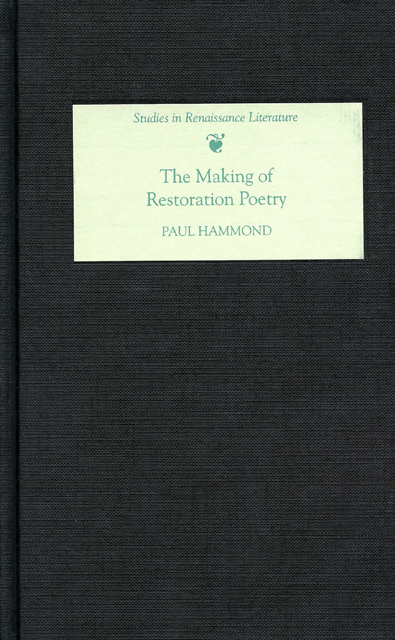7 - The Circulation of Dryden’s Poetry
Published online by Cambridge University Press: 18 March 2023
Summary
CONTINGENCY AND THE CANON
WHEN WE read the poems of Dryden in a collected edition, it is easy to forget that this is not how his contemporaries would have encountered his work. Even if an edition arranges the poetry in the chronological order of its publication, and provides ample details about its bibliographical history, it is still difficult to make an imaginative leap back to a period before the canon was completed and ordered, before the occasional and fugitive pieces were bound up with the major public masterpieces. Modern editors cannot avoid creating an anachronistic canon by reason of their very fidelity in collecting all that was written, with an assiduity far beyond anything that Dryden himself ever envisaged. It is the purpose of this essay to attempt to recover a sense of the fragmentary, haphazard, and contingent character of the circulation of Dryden's poetry, and to suggest what a late seventeenth-century reader would have understood by the phrase ‘Dryden's poems’. It will chart the pattern of publication across Dryden's career, investigating which form of publication he thought suitable for particular kinds of poems; which pieces he collected and reprinted, and which were forgotten; and which were given circulation in manuscript, either by Dryden himself, or by his readers. Building on the information presented by Hugh Macdonald and Peter Beal in their invaluable bibliographies, the present essay will seek to interpret this and other evidence so as to reconstruct both Dryden's attitude to the publication of his poetry, and the extent of the opportunities available to contemporary readers who were interested in following his work.
It is an elementary fact, but one which is nevertheless both remarkable and rarely remarked upon, that Dryden did not issue collections of his work. There were no volumes from him called Poems Written upon Several Occasions. It was not that the Restoration publishing trade eschewed such collections: notable examples of that kind of book include Denham's Poems and Translations (1668), Tate's Poems (1677), Marvell's posthumous Miscellaneous Poems (1681), Oldham's Some New Pieces (1681) and Poems, and Translations (1683), and Behn's Poems upon Several Occasions (1684). It is clear that the collection of miscellaneous poems by a single writer was a familiar form of book in the Restoration, yet Dryden chose not to publish in this way.
- Type
- Chapter
- Information
- The Making of Restoration Poetry , pp. 139 - 167Publisher: Boydell & BrewerPrint publication year: 2006

